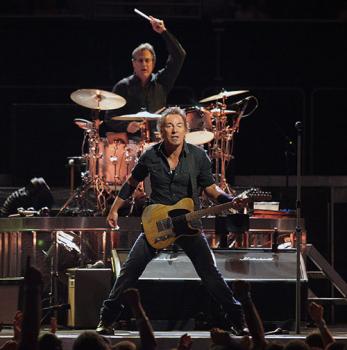This is one “Boss” Class
Students in Lincoln Konkle’s “Springsteen’s Lyrics as Literature” course are examining the timeless, universal themes—such as growing up, love, death, political power, religious faith, and doubt—that are a part of the Boss’s songwriting.

 “I found the key to the universe in the engine of an old parked car.”
“I found the key to the universe in the engine of an old parked car.”
It was this lyric from “Growing Up,” a song from Bruce Springsteen’s 1973 Greetings from Asbury Park, N.J. album, that helped Lincoln Konkle realize as a college student that Springsteen’s lyrics were deeper than the average 1970s rock song.
“Now this was rock and roll for English majors,” Konkle said of his feelings of Springsteen’s imagery- and metaphor-filled lyrics at the time.
Several Springsteen albums and concerts later, and now a professor of English at The College of New Jersey, Konkle is teaching a new generation of college students and music lovers the deeper meanings behind Springsteen’s lyrics in his First Year Seminar course, Springsteen’s Lyrics as Literature.
In the course, the students analyze lyrics to one Springsteen album per week, from early albums like Greetings and Born to Run up through his most recent albums Magic and Working on a Dream. According to the course description, Springsteen’s albums are treated “as analogous to books, each with a unifying principle of theme or type of music rather than a random collection of Springsteen’s latest songs; thus, [students] will study the albums in chronological order so that it will be possible to gain insights into the shape of Springsteen’s career and the development of the ideas and techniques in his oeuvre.” The students also read scholarly articles and books about Springsteen, and are required to write research and interpretive papers.
Konkle hopes that his students will develop a deeper appreciation of Springsteen’s literary writing, while also developing the reading, thinking, writing and researching skills that are built into all FSP courses.
“Dr. Konkle teaches a great class,” Gary Kehoe ’13, a student in the Springsteen class, said. Kehoe grew up in Freehold listening to Springsteen’s music and said his appreciation of the singer-songwriter has only grown since enrolling in the course.
“The class goes in depth to show the way the chosen writing style reflects the message the artist wishes to convey,” Kehoe said.
Kehoe added that, even if he wasn’t a Springsteen fan, he’d still look forward to the class every week because of the lively discussions and larger themes of the course.
“Along with working with Bruce’s music, we discuss the time periods and situations he sings about, [such as the] political campaigns of Ronald Reagan or the equally disillusioned superhero Adam West in the ’60s Batman television series,” Kehoe said.
Konkle had wanted to teach a course on Springsteen since the first scholarly book was published on Springsteen’s music in the late 1990s. Thanks in part to the first “Glory Days” Springsteen symposium in 2005, many scholarly books and articles have since been published on Springsteen for students to reference in research papers.
Konkle presented two papers at the September 2009 “Glory Days” symposium, one that analyzed astronomical imagery in Springsteen’s recent song lyrics and one on his “Springsteen’s Lyrics as Literature” course.
Konkle is grateful to the First Seminar Program for providing the opportunity for professors and students to connect on subjects for which they share a mutual passion.
“I’m a teacher and scholar of literature, and at his best, Bruce Springsteen really is a literary writer,” Konkle said. “The growing body of scholarly articles and books, the conferences, and the college courses devoted to Springsteen are evidence that many share my opinion, and that his body of work is worthy of rigorous intellectual inquiry.”
Posted on October 13, 2009

